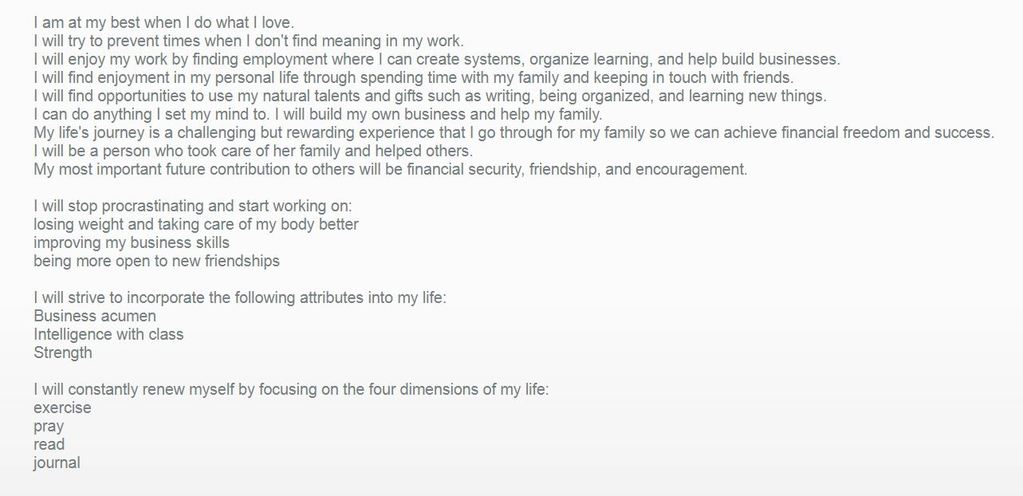

There might be affiliate links on this page, which means we get a small commission of anything you buy. As an Amazon Associate we earn from qualifying purchases. Please do your own research before making any online purchase.
Have you discovered your purpose in life yet?
Don’t worry if you haven't – most people have a hard time pinpointing the precise things that they want to get out of life.
People change, circumstances change. It is part of what makes life exciting. That said, it’s nice to have some direction rather than feel lost most of the time.
Fortunately, there is a simple fix for figuring this out. Writing a personal mission statement is an excellent way to generate a framework for defining what you want out of life and discovering why your goals are important to you.
Your mission statement will ultimately serve as a guideline for all of your habits, routines, decisions, and future goals. Going over this statement every now and then will keep you on track and help you understand how and why your values may change with time.
You may be wondering, “What is a personal mission statement?” Many people haven’t heard of it. If you are one of them, you have come to the right place.
In this article, I’ll define this concept, provide examples, and then show you how to write your own personal mission statement.
Table of Contents
A personal mission statement is a declaration of an individual’s purpose and path in life, emphasizing what is truly important to him or her. It lays out your core values, your expectations, your pledge to other people and your measurement of success.
What are your passions, your long-term goals, and your plans for achieving them?
Writing a personal mission statement will help condense all of this information into a succinct declaration so others can get a concrete idea of your purpose.
Personal mission statements were popularized when Stephen R. Covey suggested that people create them in his book The 7 Habits of Highly Successful People.
Covey argued that individuals (not just companies) should have mission statements because having a mission statement helps focus what you want your character to be and what you want to contribute to society.
In Covey's mind, writing a mission statement may be the most critical activity in taking control of one's own life.
No matter what stage of life you are in, going through the process of creating a mission statement can be beneficial. Whether you are a student looking to improve your grades, or a CEO looking to live a more balanced life, a personal mission statement will give you clarity and focus.
A personal mission statement can help you in several ways. Not only will the end product benefit you, but the process you go through to develop the statement will be greatly beneficial as well.
Your statement can help define who you are as a person, and act as a representation of your purpose to other people when you are not present. It can quickly explain to other people how you aim to pursue your goals, and why they are important to you.
It is also important because it helps you make better decisions, based on your core values to get you closer to meeting your long-term goals. It will keep you accountable for heading in the right direction of where you want your life to go because it will keep you from getting off track.
For example, if you have an idea to do something but it doesn’t fit within the boundaries of your personal mission statement, you will know that you shouldn't do it.
You may come up with some neat ideas, but that doesn’t necessarily mean it will be worth it to follow through. Your mission statement will help you weed these ideas out.
Once your personal mission statement is complete, it will seem simple. But if it is well done, it will involve a lot of effort. You have to give yourself enough time for self-discovery and self-reflection.
You need to be honest with yourself so that you can recognize your personality traits, your skills and abilities, core values and passions, dreams, and goals.
A lot has been written about how to write a personal mission statement. There are different ways to go about it, depending on the person.
Don’t worry if your mission statement doesn’t look exactly like someone else’s. Each statement is unique because no two people are exactly the same.
Creating a mission statement is not something that will happen in a day. It requires careful analysis and contemplative expression, which may require many drafts before you are satisfied with its final form. Even once it is finished, you will want to review it often and make slight changes as your life brings you new insights or developing circumstances.
Start by thinking about your personal principles and goals in life. Think about the reasons behind your goals, and how achieving them would improve you as a person.
Your mission statement should be clear and concise, without any unnecessary details.
While there are many methods one could emulate, I have taken them all into account so as to provide you with an actionable, step-by-step process for creating a powerful personal mission statement you will stick with!
An effective personal mission statement looks a lot like an outline at first. You need to run through these steps in order to create a clear picture of where you are headed.
What have you already done well? What accomplishments are you most proud of in your life?
Self-esteem and confidence in your abilities are crucial elements in seeing your mission statement come to fruition.
Whether you believe it or not, you’ve done something right in your life… you just have to take the time to rewind and reflect.
This should be where you list your past “wins”. They can be professional and/or personal.
Stopping to pat yourself on the back and acknowledge your contributions to the world, be they large or small, is a great boost to point you in the right direction towards crafting an effective personal mission statement.
Think of this as your “why”. Who do you want to be a better person for?
It is perfectly ok to say yourself, but it is also ok to say you want to be better for others. Perhaps it’s both.
Only you know who and what matters most to you. And to be honest, when you stop to think about it, the answers may surprise you.
For example, maybe you’ve been working overtime for months, only to be passed over for a promotion that you thought would improve your family’s quality of life. While the disappointment is palpable, and understandable, have you stopped to think about what sacrifices you made in order to get nowhere?
The soccer games and family dinners you missed. Your best friend’s engagement party. A special anniversary dinner with your husband. Your daughter’s first piano recital. Vacations.
The sacrifices are countless and, at the end of the day, you have nothing to show for it. What now? You begin to question your life and what you want from it. You begin to realize that time goes by fast and not always according to plan, despite our best efforts.
So do you start looking for a new job?
Do you even like your job?
Maybe you want to start your own business or change careers?
Does the big house and fancy car matter more than quality time with the people that you care most about?
This is where assessing your core values comes into play.
Core values are a set of fundamental beliefs, ideals or practices that dictate how you conduct your life – both personally and professionally.
No one person will have the same core values as another, but the principal is the same. It’s about taking action on what matters most, and living according to the principals you feel most strongly about.
Common core values include:
Factoring the people and things that matter most into your personal mission statement will help put you on the right track.
It will give you the incentive you need to make a plan that you’ll not only want to stick with, but will have a much higher rate of success.

How are you going to make an impact? What areas of your life need the most attention?
These are two questions you need to ask yourself.
It can be helpful to break things down by category and list one thing you want to see happen or change. These are goals you’d like to accomplish, whether short or long-term.
Some categories you may want to consider include:
The last one is a bit of a head scratcher for some, so it’s perfectly acceptable to create a timeline (i.e. within the next 6 months, 1 year, 5 years, 10 years).
Setting SMART Goals are a great way to ensure you keep your head in the game. They help to limit distractions, but also have some margin for error or setbacks.
If you make your goals too big, you do run the risk of failure as a more immediate sense of gratification is not there.
There is a time and a place for big, long-term goals… as opposed to setting more tangible short-term goals for your personal mission statement. Sit down and think about what you are prepared to do now and you’ll have the drive and optimism to get it done.

This is more of an exercise than anything else, but one that can surely help round out your mission statement.
I’m sure you’ve attended a funeral at some point and heard someone deliver a eulogy. At the very least, you’ve likely come across an obituary online or in the newspaper that read like a great novel about one’s life… and those people they impacted along the way.
While nobody likes to think about their own mortality, it can be a powerful tool in helping you live in the present and make the most of each day.
Take a few moments to sit down and write what you’d like people to say about you, or remember, after you are gone. Your homage, if you will.
Were you a pillar in your community? A loving husband and father? A compassionate and gracious employer who people enjoyed working for? Did you volunteer?
If you can’t come up with much to say, consider it a wakeup call to change things before it’s too late. This is your chance to write your own story, leave your mark and assess your impact on the world around you.

Now that you’ve completed the first 4 steps, it’s time to construct your personal mission statement. It should be all-inclusive, without being convoluted.
According to Ramsey Solutions, there are typically 3 parts to a mission statement of this type.
Indeed.com believes a personal mission statement can and should read even more simply. It might go something like this:
“I will [action] for [audience] by [skills] to [desired result].”
Here’s an example of this formula being executed:
“I will work from home at least one day per week to coach my son’s basketball team, sharing my high school and collegiate playing experience with him and his teammates, in order to spend quality time with my son and improve his team’s skill set.”
This statement clearly states your plan of action and desired outcome. It doesn’t veer off course by listing all of the things you need to do in order to make it happen (ie. negotiate your work schedule with your boss, start yourself on a physical conditioning and diet regime, come up with a weekly playbook).
Now that you know how to write a personal mission statement, let’s review five examples to give you a little inspiration.
Personal mission statements are just what they sound like… they are personal. Thus, they will differ from person to person.
You should not be worried about other people’s mission statements, as it’s not a competition, nor is it a race.
All that matters is that you determine what is important to you and go for it!
With that in mind, here are five examples to inspire you on your journey.
To simplify things, Franklin Covey provides an online tool that you can use to quickly generate a personal mission statement.You can think of it as the “CliffsNotes” for creating the ultimate personal mission statement.
The personal mission statement generator is a 10-step process, taking into account the following:
Here's a Personal Mission Statement generated by Covey's Mission Statement Builder.

Other original examples include (written by myself and my friends):
To use my maternal instincts and experiences to educate young mothers that decide to raise a child on their own. I will provide them with the additional resources they need to be successful and feel supported.
To use my writing skills to create a blog directed at working mothers looking to juggle the work-life balance, without feeling guilty about their choices or losing sight of who they are as a woman first.
To volunteer my skills as a doctor, working in a free clinic or foreign country, where affordable and quality healthcare is not obtainable for most people. I will make sure all basic vaccinations, life saving medications and antibiotics are readily available through fundraising efforts and corporate partnerships.
To improve the strained relationship with my spouse by communicating more openly and honestly, setting aside time each week to reconnect with one another. I will also be open to the idea of therapy in order to try to make the relationship work if our efforts aren’t enough.
Creating a personal mission statement is an important element of leadership and personal development. A proper statement will push you to ponder the purpose of your life and pinpoint what is genuinely important to you.
Personal mission statements also require you to concisely clarify your deepest values and aspirations. They emboss your purposes in your mind, making them become a part of you. Referring to your personal mission statement is also a way to keep your goals and vision in front of you at all times.
Take just 10 minutes to start writing your personal mission statement using the resources that we listed in this article. Then, think about all of your goals and habits, and consider how they line up with your mission statement.
After filtering through your habits, ask yourself if your actions align with your life’s purpose. Keep doing this exercise until you feel like your daily routine and habits are situated in a way that will ultimately give you what you want to get out of life.
Writing your personal mission statement is an activity of self-discovery that will allow you to uncover things that you may not have realized about yourself. Writing a personal mission statement will allow you to get to know yourself better and further realize your sense of purpose in life.
If you want to learn more about this concept, a good starting point to writing your own personal mission statement is A Personal Mission Statement: Your Road Map to Happiness by Michal Stawicki.
This resource will help you with your personal mission statement, no matter what your specialty in life is or what your long-term goals are.
If you want another way to actualize your long-term goals, consider crafting a life purpose statement. Or if you are more into the law of attraction, check out his post on how to manifest something by writing it down.